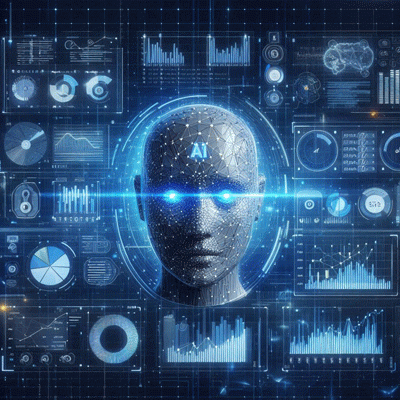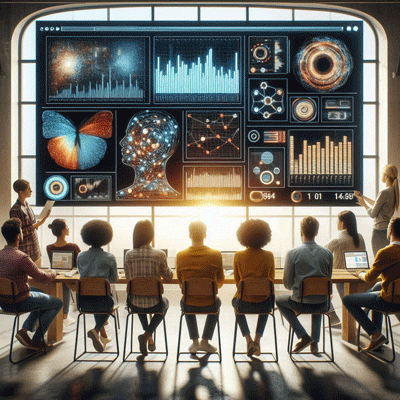
3 Reasons AI Won’t Replace Statisticians Anytime Soon
Artificial intelligence (AI) is changing the world of data analysis. AI can process massive datasets. It can also recognize patterns and make predictions. AI is a powerful tool for businesses, researchers, and decision-makers. But does that mean AI will replace statisticians? Not quite. Statisticians won’t be replaced; their role is too crucial.
While AI can handle many statistical tasks with impressive speed, there are critical areas where human statisticians are still essential. AI lacks the ability to ask meaningful questions, understand the broader context of data, and ensure ethical practices in analysis. Statisticians bring experience, intuition, and critical thinking—qualities that AI simply can’t replicate. This is why statisticians won’t be replaced easily.
Before you worry that AI is taking over, consider this. Let’s explore three key reasons why statisticians remain irreplaceable in the world of data. Statisticians won’t be replaced because their expertise is necessary for accurate analysis.

1. AI Needs Statisticians to Navigate Complex Data
AI is great at crunching numbers, but without statisticians, it can easily misinterpret data or generate misleading results. That’s because AI doesn’t “understand” data- it simply follows patterns based on past inputs. If those inputs are flawed or biased, the AI will produce inaccurate conclusions.
Human statisticians play a crucial role in ensuring data quality to ensure that AI models work effectively. They ask important questions like:
- Are the data sources reliable?
- Are there hidden biases in the dataset?
- Which statistical methods best fit the problem?
Imagine AI as a high-powered engine and statisticians as expert drivers. The engine may have the power to go fast, but without a driver, it has no direction. Statisticians guide AI, making sure it produces meaningful, accurate, and useful insights.
For example, in medical research, AI can analyze thousands of patient records to find patterns in disease progression. However, a statistician is needed to validate those findings. They ensure the data isn’t biased. They also determine whether the results truly apply to a broader population. Without statisticians, AI could lead to misleading or even dangerous conclusions. For a deeper look into data quality and analysis, read The Importance of Statisticians in Data-Driven Businesses.

#2 Statisticians: The Ethical Sheriffs of the Data Frontier
One of the biggest challenges in AI-driven analytics is bias. Since AI learns from existing data, it can unintentionally reinforce societal biases. If a dataset is skewed, AI won’t recognize the problem—it will simply continue the pattern.
This is where statisticians step in as ethical watchdogs. They analyze data to identify and correct biases before AI models are deployed. They also ensure transparency in data collection and analysis, making sure AI-driven decisions are fair and just. Statisticians won’t be replaced because these ethical considerations require human judgment.
A well-known example of AI bias occurred in hiring algorithms. Some companies used AI to screen job applicants. The training data reflected past hiring biases. As a result, the AI favored male candidates over female ones. Statisticians flagged the problem, rebalanced the dataset, and corrected the algorithm to ensure fairness.
Statisticians also play a crucial role in privacy protection. AI collects and analyzes personal data. Statisticians set guidelines for data security. They ensure that individuals’ information is used responsibly and ethically. If you’re interested in how statistics help prevent bias, check out Why the Shortage of Statisticians Matters.
3. Statisticians Turn Data into Meaningful Decisions
AI is excellent at detecting patterns, but making sense of those patterns requires human expertise. Raw data alone doesn’t drive decisions- insight does. Statisticians bridge the gap between AI’s outputs and real-world decision-making.
Think of a sports team using AI to analyze player performance. AI might predict that a certain player will perform better based on historical stats, but a statistician will look deeper. They’ll consider factors like:
- The quality of past opponents
- Weather conditions affecting performance
- Psychological factors influencing the player’s confidence
Without statisticians, decision-makers could blindly follow AI’s suggestions without understanding the deeper story behind the data. In business, politics, and healthcare, statisticians provide context and expert judgment that AI alone cannot. Statisticians won’t be replaced because their judgment is indispensable in turning data into actionable insights.
Additionally, statisticians help visualize data in a way that makes sense to others. A spreadsheet full of numbers is meaningless without interpretation. Statisticians create reports, charts, and presentations that turn raw data into actionable insights for executives, policymakers, and researchers.
If you’re curious about how AI functions, explore its collaboration with statistical tools. Read The Tools Statisticians Use: A Peek into Data Magic with JMP.
The Future: AI and Statisticians Working Together
Rather than replacing statisticians, AI is actually making their work more exciting. By automating tedious calculations, AI allows statisticians to focus on more complex problems, creative modeling, and deeper analysis. AI is a tool- an incredibly powerful one—but it still requires human oversight and expertise to be effective. Hence, statisticians won’t be replaced by AI but will work in tandem with it.
In the future, statisticians will continue to play a vital role in guiding AI’s development. They will ensure fairness in data analysis and make sense of complex information. Businesses and organizations that understand this will benefit the most. They will combine AI’s power with human intuition. This combination will unlock new levels of insight. Therefore, statisticians won’t be replaced anytime soon.

Conclusion: Why AI Won’t Replace Statisticians
As AI continues to evolve, the need for skilled statisticians will only grow. If you’re interested in learning more about the role of statisticians in a data-driven world, check out my other blogs:
- The Importance of Statisticians in Data-Driven Businesses
- Why the Shortage of Statisticians Matters
- The Growing Demand for Statisticians
Want to explore how statisticians and AI can work together for better insights? Visit Topline Statistics to learn more!
Discover more from Topline Statistics
Subscribe to get the latest posts sent to your email.

Are you drowning in data?
Let us help! Our experts will navigate, organize, and analyze your data, bringing forth clarity and actionable recommendations.
